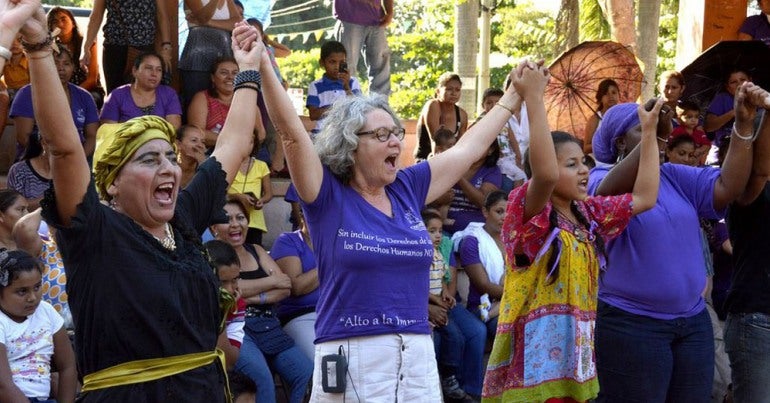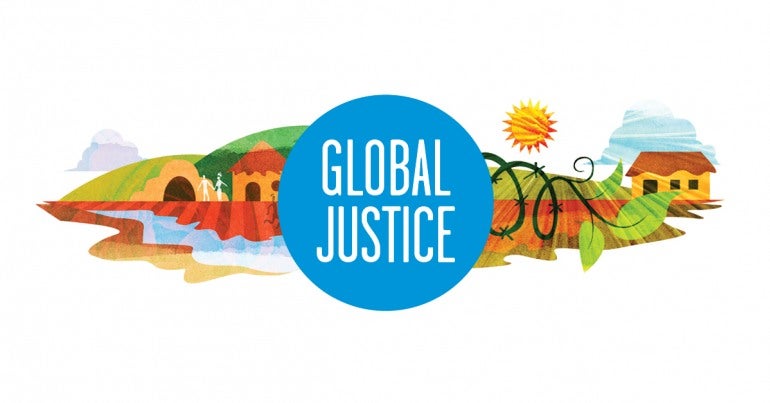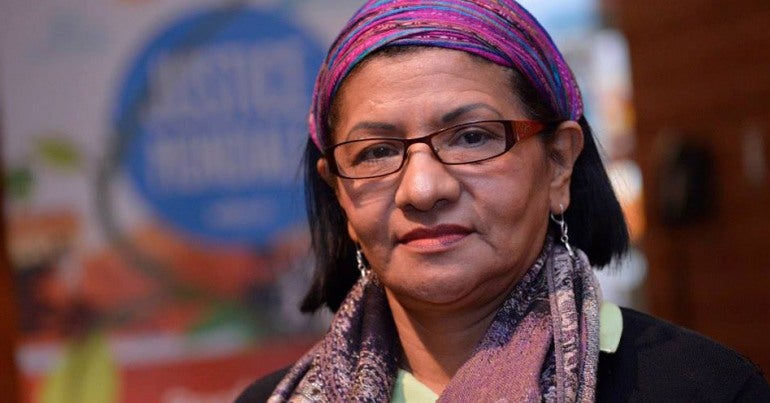 A big portion of CUPE’s international solidarity work is carried out in conjunction with our global partners. Our Global Justice Fund supports various groups and their projects around the globe.
A big portion of CUPE’s international solidarity work is carried out in conjunction with our global partners. Our Global Justice Fund supports various groups and their projects around the globe.
AIDS Free World
AIDS-Free World is an international advocacy organization with a small staff that works virtually from a dozen locations in the US and Canada, Africa, the Caribbean and Europe. AIDS-Free World continued to pursue controversial issues and causes over the course of the last year in pursuit of the all-encompassing priority of gender equality. They have launched a campaign to end immunity for sexual violence committed by United Nations Peacekeepers and also initiated a challenge to the way in which the International Labour Organization views child marriage.
It is not widely known that a 1946 UN Convention on Privileges and Immunities effectively grants immunity for sexual exploitation and abuse on large numbers of peacekeepers that report to the Secretary-General. AIDS-Free World is working to remove that immunity from the Convention.
ILO child labour statistics show that in the age group, 15 to 18, it emerged that 81 per cent of children involved in child labour were boys. Only 19 per cent were girls. This made no sense until they realized that missing entirely from the child labour numbers were girls trapped in child marriage; 15 million girls every year under the age of eighteen. AIDS-Free World believes that the circumstances of a young girl’s life imprisoned in an illegal child marriage is equivalent to the worst forms of child labour. They are now intent on persuading the ILO to count child marriage in the child labour statistics.
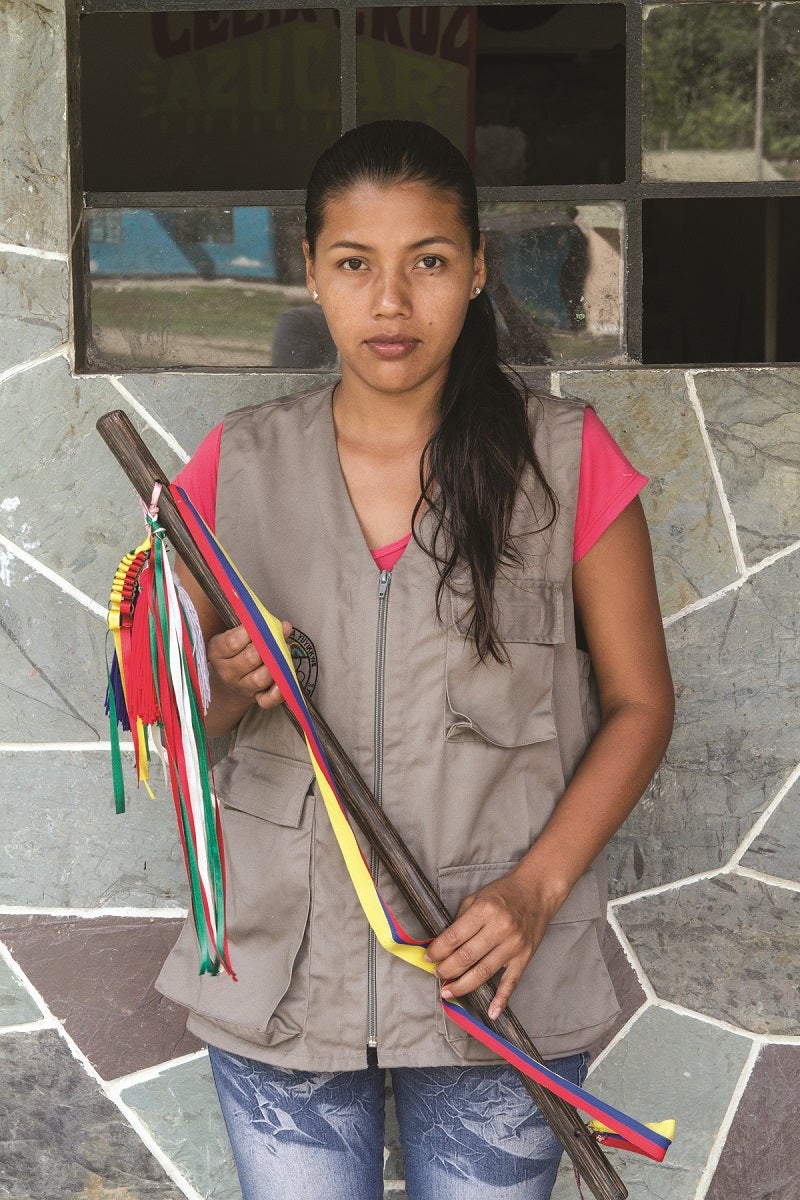 COLOMBIA – NOMADESC
COLOMBIA – NOMADESC
CUPE’s project partner NOMADESC works on global defence of human rights to build policies for a transformative, holistic and participatory peace in the southwest of Colombia.
Although the peace negotiations between the Government of Colombia and the FARC (The Revolutionary Armed Forces of Colombia) are underway, Colombia’s internal armed conflict continues to result in serious abuses by irregular armed groups, including guerrillas and successor groups to paramilitaries. Human rights defenders, trade unionists, journalists, indigenous and Afro-Colombian leaders, continue to receive death threats and face abuse. Attacks, as well as the misuse of the legal system to bring sometimes bogus charges against human rights defenders and the theft of sensitive information from NGO offices continues to undermine the work of human rights organizations.
One area of particular concern over the past year is the growing violence against Afro-descendent communities in Buenaventura, a pacific coast port city in Valle de Cauca, which is considered the most dangerous city in Colombia.
CUPE’s partner NOMADESC continues to respond to the urgent needs of the communities with which they work. NOMADESC works to defend the rights of Colombian communities and trade unionists through education, accompaniment of advocates and mobilization. They are an integral part of human rights defence work in the southwest of the country working directly with unions, women, indigenous, afro-Colombian and campesino communities.
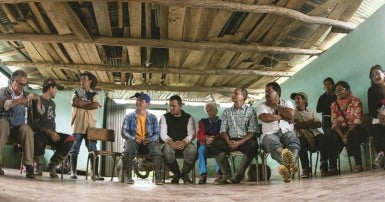 COLOMBIA – SINTRACUAVALLE
COLOMBIA – SINTRACUAVALLE
SINTRACUAVALLE is CUPE’s partner union of water workers in the public water and wastewater utility ACUAVALLE. It celebrated its 50th anniversary in February and has a long history struggling against privatization and promoting public ownership and operation of water services.
At the national level, 30 per cent of Colombians do not have access to potable water. The Colombian government’s solution to this program is a P3 driving “Water for Prosperity” plan that will include guaranteed profit and incentives for private companies interested to make water a lucrative commodity.
SINTRACUAVALLE is located in the Valle de Cauca region, an area highly affected by violence during 50 years of civil war. It is a region with high rates of unemployment and poverty making public water a vital service to the families living in this area of Colombia; 95 per cent of the population are poor.
Over this past year, SINTRACUAVALLE has prioritized municipal lobbying and has been conducting meetings and forums with municipal councils about the work of ACUAVALLE and the importance of keeping water as a public good. Public activities such as ACUAVALLE in the Park have garnered public support for the union and the public utility. In addition, the union is focusing on creating partnerships with communities in the Valle de Cauca region who are managing their own water services and who have requested technical support.
NICARAGUA – Maria Elena Cuadra (MEC)
CUPE’s partner in Nicaragua is defending the labour and gender rights of women maquila workers. The Maria Elena Cuadra Movement of Employed and Unemployed Women (MEC) is engaging maquila workers in the Jobs YES, but with Dignity campaign. It is a campaign about workers’ rights in Central America.
The monthly minimum wage for maquila workers in Honduras in 2012 was US $233 and in Nicaragua was US $140. This is one of the lowest paid sectors in both of these countries. Forced overtime and long hours undertaking repetitive movements to meet unrealistically high production targets, as well as unsafe working conditions and minimal periods of rest, have left many maquila workers with permanent injuries. Factory owners routinely deny workers medical care and refuse to pay out compensation for negligence. Labour laws fail to address health and safety risks posed by this industry. In addition, many workers are fired without cause and factories often close up shop overnight, and most often these workers are not given their severance pay.
Women’s organizations across Central America have come together as part of a network to work together to tackle some of these problems. Since the 1990’s they have framed many of their actions within the Jobs YES, but with Dignity campaign. Over the years, stages of the campaign have included: Health is our right, Jobs YES, but with Dignity and Stop workplace violence. These organizations make clear that maquila workers want to keep their jobs, and therefore boycotting the industry is not the answer. Instead, they are working to change the conditions that these workers face in these factories
Each country has adapted the campaign to their country context. In Nicaragua, MEC focuses on advocacy work to support women to defend their human rights and labour rights from a gender perspective. They use the campaign to raise awareness about the working conditions of women maquila workers and about actions to improve this situation.
HONDURAS – CODEMUH
In Honduras CUPE has partnered with the Honduran Women’s Collective (CODEMUH), which specializes in occupational health and safety. They use the Jobs YES, but with Dignity to raise awareness about the working conditions of women maquila workers and about actions to improve this situation. They are working to change the labour code in Honduras to include more work-related injuries, raise awareness about the damaging effects of the 12 hour work day, ensure workplace injuries are correctly categorized by the health system and advocate for ergonomically correct work stations.
PHILIPPINES – ACT
CUPE’s worker-to-worker solidarity with the Alliance of Concerned Teachers (ACT) helps to build grassroots unionism in the education sector.
President Aquino celebrated his 4th year in office but the teachers to whom he refers to as one of his “bosses” do not see any reason to celebrate. He has been promoting an anti-teacher, program in the K-12 sector. The national budget does nothing to support the demands of the people because it prioritizes paying external debt instead of providing for social services like education.
ACT is stepping up its efforts for a living wage and quality education for all Filipino people. They are engaged in mobilizations and organizing drives that seek to certify more ACT locals as formal bargaining agents of the teaching and non-teaching personnel in the education sector.
ACT joined the campaign called Save Our Schools (SOS) and joined a task force among local NGO’s to pressure the Department of Education to rescind a memo that allows the use of schools during military operations, something that is against the law in the Philippines.
PHILIPPINES – COURAGE
CUPE has partnered with COURAGE in a worker-to-worker solidarity project defending human rights and the right to public water in the Philippines.
The Water System Employees Response (WATER), a national federation of water district unions affiliated to COURAGE launched a nationwide campaign in 2014. The campaign aims to organize workers and strengthen their unions to better prepare them against the looming onslaught of privatization in the water sector in the Philippines.
Massive worker opposition to privatization halted an earlier attempt by the government to legislate privatization in the water sector. Several bills reemerged that would create a foundation for more privatization in the water sector, mainly through through Public-Private Partnership projects, management contracts, concession agreements and many others.
In addition to protests, workers are also organizing and forming new unions and the more established unions are conducting education seminars aimed at a better understanding the policies of privatization, liberalization and deregulation. City and provincial councils are supporting the workers’ led campaigns Water is life, Stop Privatization and Water, a Human Right.
Our work with COURAGE, and its WATER network will focus on opposing the Bulk Water Supply Projects in the Philippines and the relentless effort the government to turn over public water services to corporate monopoly control.
BURMA – The Burmese Women’s Union
“To build a sustainable developed and peaceful society, women’s dynamic participation in all levels of the political process is a key foundation” is the slogan often heard at the Burmese Women’s Union (BWU). It is a slogan that reflects the determination of the BWU to achieve their goal.
The BWU held its 7th Congress in Chiang Mai, Thailand in January 2015. Leaders travelled from the border and refugee camps in Thailand, India and China to participate in discussions about the current political situation in Burma and the future direction of the union.
Congress determined that the environment was still not secure for women to meaningfully engage in politics. While many believe there has been genuine democratic reform in Burma, in reality there are still ongoing armed conflicts in ethnic areas. Women are facing human rights violations, including property theft, sexual violence and loss of life. There is a pervasive culture of impunity that will not be overcome until women are able to participate in all levels of the political processes.
BWU plans to focus on the issues of violence against women, peace building, women’s rights and gender equality and politics in order to create the conditions to establish a genuine democratic federal union. Plans include establishing a hotline for women who experience violence, advocacy for monitoring women’s active involvements in the peace process. The BWU is also working on the production of advocacy handbooks on women political prisoners, domestic violence, sexual harassment and women’s rights.




